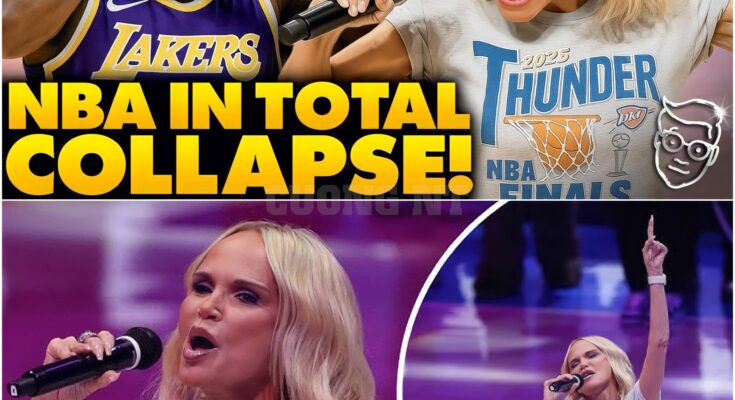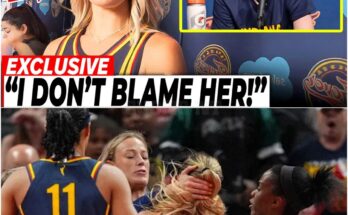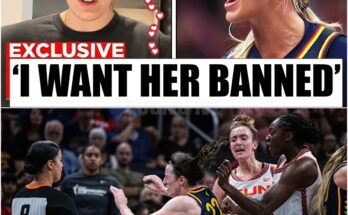In a moment that has reignited a years-long debate about patriotism, entertainment, and sports activism, the NBA once again finds itself at the center of controversy following a polarizing national anthem performance. The latest incident, featuring Tony Award-winning Broadway star Kristin Chenoweth, has prompted a wave of criticism from fans and commentators—adding fuel to ongoing concerns about the league’s declining ratings and its complicated relationship with its audience.
The incident took place during a high-profile NBA Finals game, with Kristin Chenoweth, known for her powerhouse vocals and acclaimed Broadway career, stepping onto the court to deliver the national anthem. For many viewers, however, her performance missed the mark.
Online reactions ranged from disappointment to outright mockery. Social media lit up with posts comparing the performance unfavorably to previous infamous renditions, such as Fergie’s much-maligned 2018 All-Star Game attempt and even Roseanne Barr’s notoriously off-key 1990 performance. “I’d rather listen to Fergie’s anthem performance than Kristin Chenoweth’s,” wrote one commenter. Another quipped, “That high note made my dog uncomfortable.” Some went further, questioning whether the choice of anthem performers in recent years is part of a larger trend of disregard for tradition.
Disrespect or Artistic Freedom? The Divide Widens
For critics, the national anthem is more than just a pre-game ritual—it’s a symbol of unity and respect. Incidents of anthem “disrespect,” whether perceived or real, have sparked controversy since the 2019–2020 season, when player activism and visible protests became a fixture in the league. “When you have a sports league that employs some of the most privileged, entitled, narcissistic activists and they decide to systematically disrespect the national anthem, you’re going to have a real problem on your hand,” argued one commentator in a now-viral YouTube segment.
This sentiment echoes a broader frustration among some fans, who see anthem protests or unconventional performances as divisive and detrimental to the league’s image. “The price of authenticity is being disliked,” Chenoweth reportedly stated in response to the backlash, but for her critics, the price of perceived disrespect is far higher: alienating a loyal fan base and deepening the NBA’s ratings woes.
The numbers are hard to ignore. Since the NBA’s 2019–2020 season, television ratings have struggled to recover from their pre-pandemic highs. The league’s foray into “forced activism,” as some call it, coincided with a dramatic drop in viewership. According to the transcript, “An absolute and total catastrophic collapse in ratings—not just for the finals but for all-around season ratings. They’ve never recovered. It’s an absolute and total catastrophe and downfall.”
While multiple factors contribute to fluctuating ratings—including cord-cutting, changing viewer habits, and competition from other entertainment—the anthem controversy remains a lightning rod for disaffected fans. Comments online frequently link the league’s activism and anthem-related incidents to their decision to tune out. “Nobody is quite sure how to recover,” the commentary continues. “This ain’t the way.”
A History of National Anthem Drama
The NBA is far from alone in dealing with controversial anthem moments. The transcript referenced infamous performances from the NFL as well, with artists like Christina Aguilera and Roseanne Barr delivering renditions that became cultural talking points. But for many NBA followers, the league’s ongoing struggles with public perception are uniquely intertwined with its approach to social issues and national symbolism.
Even as some defended Chenoweth’s talent and intent—“She’s a Broadway legend, let’s be serious”—others insisted that her approach didn’t fit the moment. “Putting the theater into this national anthem, I’ve had at least two generationally bad national anthems during the finals,” lamented another observer.
The League’s Response—and the Road Ahead
So far, the NBA has largely declined to comment on the controversy, choosing to highlight the diverse array of talent it brings to major events. For league officials, balancing entertainment, activism, and tradition has proven to be a delicate act—one made even trickier by a deeply divided fan base.
As the dust settles, the debate about how the NBA should approach the national anthem is far from resolved. The league’s next moves—both on and off the court—will be closely watched by supporters and critics alike.
For now, one thing is clear: the intersection of sports, patriotism, and public opinion remains as contentious as ever. And as long as the NBA continues to grapple with its identity, the conversation about the national anthem—and what it represents—will keep playing on.




